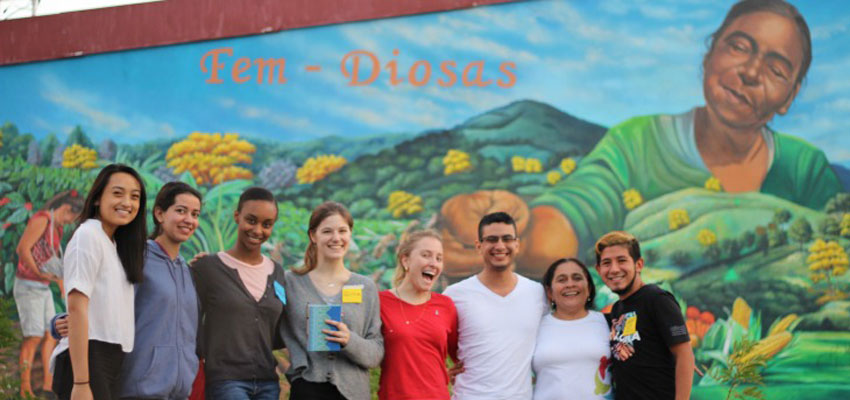
"Having the chance to create a valid visual, educational, and often emotional, connection between our academic research and the lives that are maintaining and affecting these areas of prior research is a chance that not many have and an opportunity for us to grow as learners and recognize the significance of individuals often overlooked in a global world."
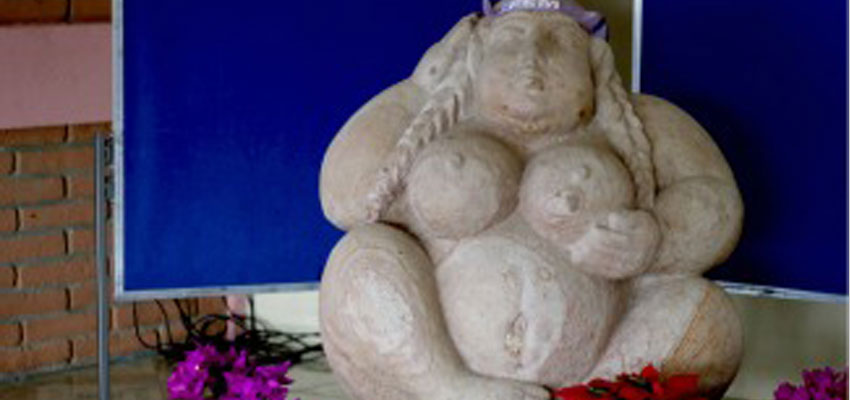
A group of four MIT D-Lab students, Juliana (visiting PhD student and trip leader), Olivia, Janel and Thea, two Universidad Centroamericana (UCA) de Nicaragua students, Gabriela and Laureano, along with their professors Migdália and Nelson, went to Estelí to explore the Fundación Entre Mujeres (FEM) in Nicaragua. The figure of a full-bodied woman sits proudly in the meeting room at the FEM headquarters. Surrounded by fresh flowers, perpetually lit candles and incense, seeds, and beans, the figure represents mother earth and the cycle of growth and protection that she offers not only to the women at FEM but also to the people of the world. The statue is significant because of her conspicuous dimensions as well as what she represents. Equality, abundance, equilibrium, and inclusion are embodied in the figure.
FEM provides women a place to be empowered and educated through redefining existing power relationships. Beginning with education through an ideological approach, a meaningful change begins to take place as women can see themselves as autonomous over their own lives and their connections with nature, businesses, and success. Ideology and education inevitably lead to organization allowing women to transform their lives. Since FEM is a non-governmental organization (NGO), the economic empowerment is represented by Las Diosas, which is a social, organic and fair trade enterprise. Las Diosas is the third step in the process that FEM practices and can be achieved only after the ideology and organization are solidly grounded within every individual.
Day One
Monday, January 8th, 6 AM: The alarm rang and in fifteen minutes we were ready to start our journey from Managua to Estelí, a city that hosts one of the most empowered group of women any of us have ever seen. We were dumbfounded by the strong and inspiring speech given by Diana, one of the co-founders and director of Fundación Entre Mujeres (FEM). We are fascinated by the level of maturity, aspiration and ideological strength of FEM. They are not only looking to achieve economic empowerment in a classical way, they are envisioning a new model of development that they call “Economía Feminista” which goes beyond the traditional economic and business theories of empowerment. It is really a groundbreaking approach. They hope to usher in a new non-violent and anti-patriarchal economic system that stands for the well-being of all women, where they are guaranteed the right to potable water access, better quality of food, sexual rights and body ownership, agroforestry sustainability, and dignity!
Day Two
Day Two dawned bright and early for the core MIT D-Lab/UCA team stationed in Esteli, but even earlier for the workshop participants, many of whom journeyed from over two hours away (taking multiple public buses) to join us for a day of brainstorming and participatory development. Following an introductory icebreaker, the 15 women in attendance split into five groups and rotated among “mesa-café's," answering a series of detailed questions about the effects of climate change on their livelihoods and their status as female farmers and cooperative members. Their insightful responses were consolidated into SWOT diagrams (or “FODA” charts, in Spanish), which detailed the Strengths, Weaknesses, Opportunities, and Threats associated with each of their three main agricultural products: coffee, honey, and hibiscus flower. These charts were distilled into the three most pressing difficulties facing the production of each crop: one oft-repeated complaint was women’s lack of access to land ownership. In the afternoon, the women set about drafting detailed diagrams of the coffee, honey, and hibiscus production processes, and a subsequent brainstorming session identified the weakest links in the value chains.
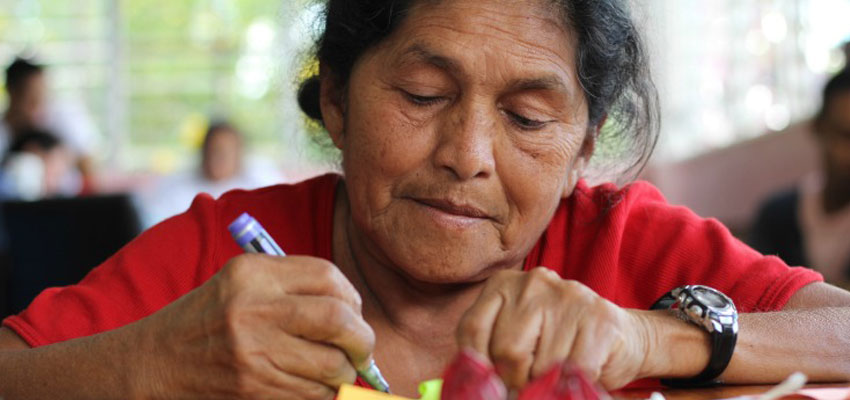
Day Three
In the verdant hills of Colorado (Nicaragua), we chatted with Isabel, president of the COOPAMUJER cooperative. She spoke to us about her practice of honey cultivation, or apiculture: there are eight hives on her property, and her recent acquisition of a centrifugal honey extractor (via FEM) has more than doubled her production. Roughly half of her hives are exposed to full sunlight in a clearing behind her house, and the rest are nestled in a shadowy glade; she tells us that the bees in the shade are far more aggressive than their sun-drenched compatriots. She confides in us that her four now-grown sons hate the bees. Speaking of her children, she believes strongly in the importance of sensitizing girls and boys to gender dynamics from a very young age, and she hopes to someday enroll her granddaughters in the youth division of FEM. “We can’t change the old, but we can change the young,” she asserts.
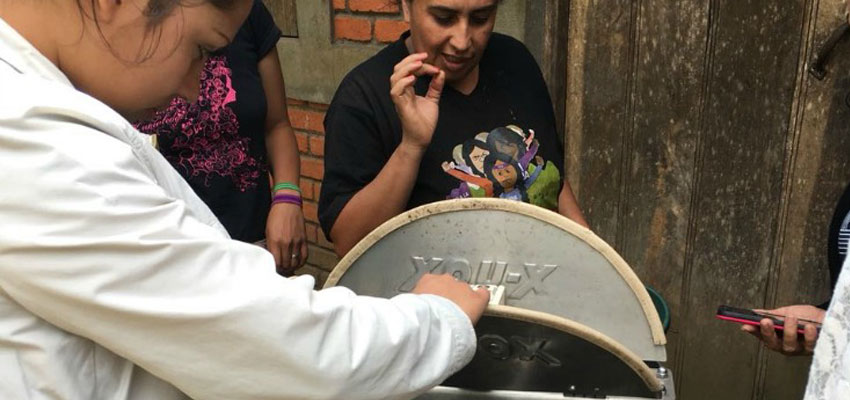
Lucía, also member of COOPAMUJER, cultivates livestock and vegetable crops for her family’s consumption, and she donates a small parcel of land to FEM for experimentation with new seedlings. She also grows coffee on the two manzanas (1 manzana = 1.72 acres) of land that she has owned since 2009. She notes that coffee yield has plummeted in recent years, primarily as a result of La Roya, a fungal infection that decimated Nicaraguan agriculture from 2012-2014. New crops have been planted, but it takes approximately four years for the coffee plants to become viable.
Our hardy group of travelers trundled back down the hill and into the living room of Maria Theresa, president of the COPEMUJER cooperative in Los Llanos 1. She is a bubbly, vivacious woman of 50 years who doesn’t look a day over 40 and sports leopard-print leggings like a pro. Maria, who dispenses warm hugs indiscriminately, immediately plied us with freshly-picked Mandarin oranges from her garden. (The extent of her goodwill is such that at one point, she took a phone call from her son’s former girlfriend - whom she endearingly referred to as “muchachita” - and made plans to meet later that day.)
Maria’s primary cash crop is coffee, and she too has registered a significant decline in yield over the past few years. She also cites women’s limited land ownership prospects as a significant problem faced by her community.
Looking Forward
Following three intense days of powerful and inspiring workshops, conversation, and exploration, the team looks forward to what the remainder of the trip will hold. As we move forward into another day of field visits to the homes, farms, and land owned and/or operated by the members of the co-ops, we are eager to see and hear what the women have to teach us. The field visits will continue to allow us to delve deeper into the day-to-day operations of the co-ops that we learned about in research prior to our trip. Having the chance to create a valid visual, educational, and often emotional, connection between our academic research and the lives that are maintaining and affecting these areas of prior research is a chance that not many have and an opportunity for us to grow as learners and recognize the significance of individuals often overlooked in a global world.
Additionally, we will enjoy continued discussions within the FEM headquarters with presidents, members, and FEM co-founders. After our previous workshops and days of field visits, the final meeting will serve as a platform to share and discuss our findings including strengths, weaknesses, opportunities, and threats, exposed during the field visits and supported by our initial workshop. Our final meeting gives us the information that we need to continue making progress on a growing program and to continue to supply women on the ground with the support that they need to ultimately own the program and thrust themselves into a continuous upward trajectory of success with FEM. The women who operate within FEM represent a small-scale enterprise that, with continued progress, can serve as an archetype of sustainable farming and “Economía Feminista” model!
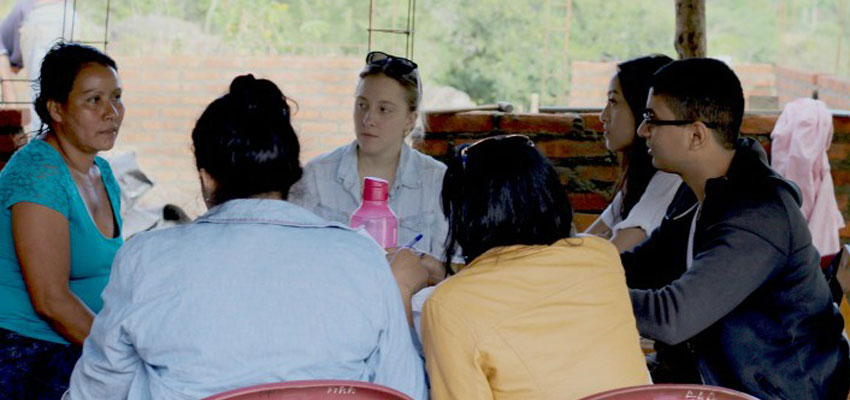
Not only were our eyes opened to new perspectives on a feminist economy, small business transitory periods, and the strengths and difficulties associated with operating within a co-op, but our hearts were also opened to the individual stories of the women making Fundacion Entre Mujeres possible. Having first-hand interactions with the trailblazing women of FEM has set us up for an invaluable educational experience during our time in Esteli, Nicaragua.
Note: This project is part of the Resilient Economies Action Lab (REAL), a D-Lab Inclusive Markets program. The work of these students will be continued in the Spring 2018 class D-Lab: New Economies in which students will return to Esteli, Nicaragua to work with Fundacion Entre Muujeres in a co-design workshop developed to support the creation of solutions that will allow smallholder farmers to become more resilient to climate change.

